Sean McDermott
Seán MacDiarmada
1884-1916
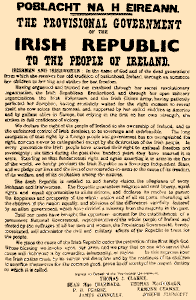
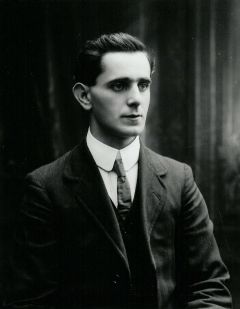
Sean MacDermott was born in Co. Leitrim
on 28 February 1884, the son of a farmer.
After running away from home at the age of 15, he went to Glascow in Scotland where an
uncle took him under his wing, providing him with work.
He later returned to Ireland, and got involved in the
Gaelic League in Belfast.
Here, the members of the Irish Republican Brotherhood noticed Sean's leadership
qualities, and when the IRB formed the Dungannon Clubs, he was invited to join the
Belfast IRB. He was a member of the Sinn Féin party and devoted his interests to
the struggle for Irish Independence.
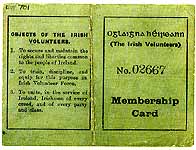
Membership Card - Irish Volunteers
During those early years, Polio was rampant, and Sean suffered from the crippling disease.
He was not paralysed, but he always walked with a stick from then on, even into the
battle of Easter Week.
In the few years before 1916, Seán's activities and speeches in County Galway against
conscription for World War 1, brought him to the attention of the police who worked
tirelessly to repress any "subversives" and as a result he spent 4 months in gaol.
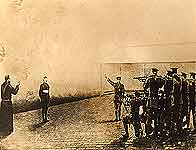
Execution of Sean McDermott
In a memorandum sent by General Sir John Maxwell to
the then British Prime Minister, Herbert Asquith, the following description was
provided for Sean MacDermott:
This man signed the Proclamation of Irish Independence. He was one of the most prominent
of the leaders of the Irish Volunteers and attended at the meetings of the Executive
and Control Councils. He wrote and sent despatches and mobilisation orders for and to
the rebels during the rebellion and he surrendered with a body of rebels in Sackville
Street with whom he had been operating for the previous week.
Sean MacDermott was
tried by Field General Courts Martial on 3 May 1916. The proceedings are contained in
the PRO document WO 71/344. They were unavailable to the people of that time because of
British censorship.
Court Martial Proceedings
The members of
the courts martial were Colonel D. Sapte (President), Lieutenant-Colonel Bent and Major
F.W. Woodward.
At his trial, Sean MacDermott faced two charges to which he pleaded
not guilty:
" ... did take part in an armed rebellion and in the waging of war
against His Majesty the King, such act being of such a nature as to be calculated to
be prejudicial to the Defence of the Realm and being done with the intension and for
the purpose of assisting the enemy."
"Did attempt to cause disaffection among the
civilian population of His Majesty."
The 1st Witness was Constable Daniel Hoey
(Dublin Metropolitan Police) who stated:
I have known the accused by the name of
John McDermott, or in the Irish form Sean MacDiarmada, for 3.5 years. The accused
associated with leaders of the Irish Volunteers, Thomas Clarke, P.H. Pearse, Joseph
Plunkett, Frank Fahy, Joe McGuinness, E.J. Duggan and others.
They held executive
meetings once a week and General Council meetings once a month at HQ Irish Volunteers,
2 Dawson Street. The accused and those mentioned attended these meetings. The accused
visits an office in 12 D'Olier Street Dublin frequently. It has the name
Sean MacDiarmada on a plate. I have seen some of the others mentioned visiting there;
Thomas J. Clarke had a tobacconist's shop at 75a Parnell Street. This shop was
frequented by leading members. I have seen the accused there frequently. I did not
see the accused at Liberty Hall, the headquarters of the General Transport and Workers
Union.
After being questioned by the accused the witness made the following
statement:
I have only known the accused to associate with Irish Volunteer leaders
during the last 12 months. I have known him for 3.5 years but at first he did not so
associate as far as I know. I do not know all the objects of the Gaelic league but I
understand the Irish Language is one of them. I do not know his connection with the
Gaelic League, I have not enquired into it. I have not seen the accused at the
HeadQuarters of the Gaelic league.
The report of the Central Executive meeting of
the Irish Volunteers is published in the "Irish Volunteer". A paper known as
Nationality is published at 12 D'Olier Street. This is the accused's principal means
of livelihood. There are several offices in 12 D'Olier Street. Clarke's shop sells
papers etc as well as tobacco. He did a good business there. I have seen the accused
visit many public houses and remain a considerable time.
The 2nd witness was
Lieutenant W.H. Ruxton (3rd Royal Irish Regiment) who stated:
I was on duty in
Parnell Street on the 29th April 1916 when 3 parties of rebels: two armed and one
partially armed with knives and some ammunition, surrendered. The accused was one of
the two armed parties who surrendered between 6 and 7 pm. The accused spoke to me and
said he would not be able to march far on account of his leg. I asked him why he could
not march. One of the others told me his leg was paralysed. I asked the accused "How
did you get into this affair". The accused replied to the effect that he had his place
in the organisation. The parties came from the direction of the General Post Office.
They were sent on to the Rotunda. I am positive the accused is the man I spoke to.
When Lieutenant Ruxton was cross-examined by the accused he stated that there were
about 200 men in the accused's party. They were not all armed. I did not see any arms
in the accused's possession.
The 3rd witness 2nd Lieutenant S.A.L. Downing (3rd Royal
Irish Regiment) who stated:
I was on duty on 29th April 1916 in Sackville Street.
I took the names of about 23 of the rebels after they had laid down their arms. The
accused was in that party and is shown on the list, but I do not know if he actually
gave the name.
When cross-examined by the accused, 2nd Lieutenant Downing admitted
that he did not pay particular attention to the surrender of arms and did not see the
accused with any arms.
The 4th witness was Lieutenant-Colonel H.F. Eraser (21st
Lancers) who stated:
I was present in the Richmond Barracks Dublin on the 30th
April 1916, and identify the accused as one of those confined there, but not
necessarily on that date. All papers taken from the prisoners on this occasion were
handed to me. I identify the paper produced as one of those handed in to me in the
gymnasium on that day.
The 5th witness was Edward Gaunon (Warden Mountjoy Prison
Dublin) who stated:
I identify the accused as John McDermott who was confined
in Mountjoy Prison Dublin in May/June 1915. I produce the cash and property book,
in which the accused signed his name Sean McDiarmada on the 26th May 1915. The
spelling is the same as on the document now shown to me. Except for the S, there is
a strong resemblance between the signatures.
When cross-examined by the accused
Gaunon admitted that he was not a fluent Irish scholar.
The 6th witness was
Captain Henry de Courcey Wheeler who stated:
On 7 May 1916 at about 6.30pm I
searched ...
[part of record is missing]
... the voice of a man named
McDermott, not the accused, but a man I had not known before, I did not attend the
weekly meetings of the Irish Volunteers, nor any of their meetings. I sent them
their accounts by post.
Court
Martial Verdict
Sean MacDermott was found guilty of the 1st charge and not guilty
of the 2nd. He was sentenced to death by shooting. The sentence was confirmed by
General Maxwell.
On his last walk down the steps into the yard, his last words
were, "God Save Ireland". At 3.45am on 12 May 1916, Sean MacDermott was shot in
the former stonebreakers yard at Kilmainham Prison. His remains were later buried
in Arbour Lane Cemetery.
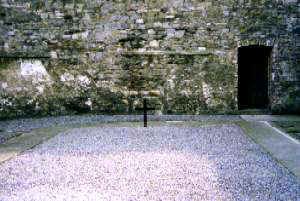
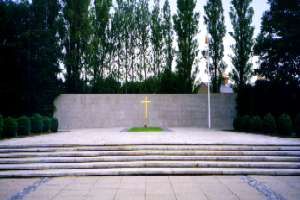 Place of Execution, Stonebreakers Yard in Prison
Memorial in Arbour Lane Cemetery.
Place of Execution, Stonebreakers Yard in Prison
Memorial in Arbour Lane Cemetery.
|





